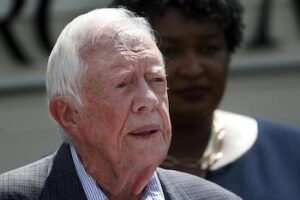
Jimmy Carter
*Jimmy Carter was born on this date in 1924. He was a white-American politician and humanitarian.
James Earl Carter Jr. was born and raised in Plains, Georgia. As a child, Carter's family moved several times, settling on a dirt road near Archery, GA. This community was made up of underprivileged Black families. He had three siblings: Gloria, Ruth, and Billy. Carter's mother was often absent during his childhood since she worked long hours, and although his father was staunchly pro-segregation, he allowed Jimmy to befriend the Black farmhands' children.
Carter had his acre of his father's farmland, where he grew, packaged, and sold peanuts. Carter also rented out a section of the tenant housing. He graduated from the U.S. Naval Academy in 1946 and joined the US Navy's submarine service. He was an athlete, running cross-country with fellow Academy classmate Wesley Brown. Carter returned home after his military service and revived his family's peanut-growing business. Opposing racial segregation, Carter supported the 20th-century American Civil Rights movement and became an activist within the Democratic Party.
He served in the Georgia State Senate from 1963 to 1967 and then as governor of Georgia from 1971 to 1975. As a dark-horse candidate, Carter won the Democratic nomination and defeated the incumbent Republican president in the 1976 presidential election. He pardoned all Vietnam War draft evaders on his second day in office. He created a national energy policy with conservation, price control, and new technology. He signed into law the Humphreys-Hawkins Full Employment Act on October 27, 1978. Carter successfully pursued the Camp David Accords, the Panama Canal Treaties, and the second round of Strategic Arms Limitation Talks. He also confronted stagflation. His administration established the US Department of Energy and the Department of Education.
The Iran hostage crisis marked the end of his presidency, an energy crisis, the Three Mile Island accident, the Nicaraguan Revolution, and the Soviet invasion of Afghanistan. In response to the invasion, Carter escalated the Cold War by ending détente, imposing a grain embargo against the Soviets, enunciating the Carter Doctrine, and leading the multinational boycott of the 1980 Summer Olympics in Moscow. He lost the 1980 presidential election in a landslide to Ronald Reagan.
After leaving the presidency, Carter established the Carter Center to promote and expand human rights; in 2002, he received a Nobel Peace Prize for his related work. He traveled extensively to conduct peace negotiations, monitor elections, and eradicate infectious diseases. Also, after his term, he often taught American Studies at Emory University as an adjunct Professor. Carter was a key figure in the nonprofit housing organization Habitat for Humanity. He has also written numerous books, ranging from political memoirs to poetry, while continuing to comment on global affairs, including two books on the Israeli–Palestinian conflict, in which Carter criticizes Israel's treatment of Palestinians as apartheid.
When President Obama was in office, and Republicans were openly talking about obstructing him to try to ruin his chances for re-election, he was the one who was on television. He said that's racist, a bold statement at the time. Polls of historians and political scientists generally rank Carter as a below-average president, though scholars and the public more favorably view his post-presidency as the longest in US history. Jimmy Carter died on December 29, 2024.